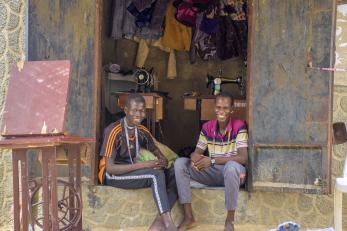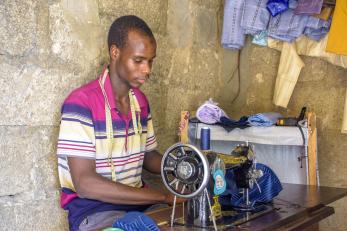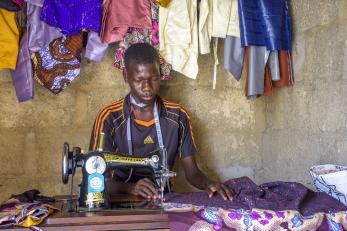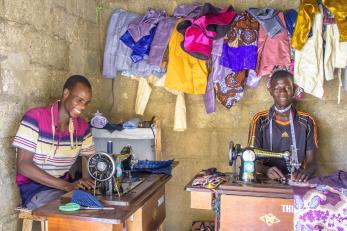Stitching Hope: Bashir and Mohammed's Journey from Survival to Success in Jere

Since prehistoric times, when people roamed the forests hunting and gathering, to the industrial age, and now in the information age, humans have always engaged in activities to earn a living. However, as times have changed, livelihoods have become more complex. In today's interconnected societies, certain factors, such as peace, need to be in place before people can effectively earn a living.
The Boko Haram insurgency in northeast Nigeria has resulted in the loss of over 350,000 lives, with more than 1.1 million lives at risk, according to a U.N. Development Program (UNDP) 2021 report. Apart from the loss of lives, the insurgency has also led to the destruction of the means of livelihood for millions of families, pushing them into poverty. With the farmland inaccessible and the road network becoming increasingly unsafe, many communities are cut off, limiting trade opportunities, especially for the residents of Jere, Borno State, where the insurgency began. Some people have turned to negative coping mechanisms, leading to a rise in crime and transactional sex in the region, while others are left unemployed, relying on the support of those around them.
This is the story of Mohammed Mustapha and Bashir Bukar, two young men from the Moforo community in the Jere Local Government Area (LGA) of Borno State. Their lives changed when they participated in the USAID-funded Transitioning Households to Recovery from Vulnerability from Emergency (THRIVE) program. Through this program, they received training in livelihood skills and were able to start a successful tailoring business together. Mohammed and Bashir's inspiring journey with THRIVE highlights the power of patience, resilience, and collaboration.

“I used to spend the entire day doing nothing,” Bashir recalled, reflecting on his life before he joined the THRIVE program. He continued, “When I needed anything, I would just ask my mother. If she had it, she would give it to me. If she didn't, I would be left with nothing.” Mohammed had a slightly different situation, saying, “Before THRIVE, I was an apprentice with a carpenter. Sometimes, after a day's work, he would give me between N200 and N500, depending on how well he was paid.”
Participants receive three days of business development training. During the training, they learn how to write business proposals, conduct market analysis, manage customer relations, and save. Mohammed shared an example of applying the training when dealing with a difficult customer: “I remembered what we were taught about how the customer is king and had to find a way of resolving our differences amicably.” He continued, “One key lesson from the training is that delivering clothes on time can prevent problems with customers.”

After the initial training, they were paired with community-based artisans who trained them for three months. Following this, they completed another three months of internship with the artisans. Upon successful completion of the training, they were equipped with start-up kits to begin their own businesses. The positive impact of this program on the participants is clearly visible.
“When we received the startup kits, we were working independently from home. We averaged about N800 to N1000 daily in profits. Later, while discussing partnership lessons during the training, I suggested to Bashir that we rent a shop and open a workshop. Fortunately, he agreed, and we took a loan of N40,000 from our parents and rented this shop,” Mohammed shared. “Now we earn about N3000 to N4000 daily," he concluded. Sharing his story, Bashir said, “The day I brought money home for the first time was the proudest moment of my life. ‘I, who always depended on my mother for everything, will one day be the one giving her money,’ something I never imagined I would do.”
The challenging economic situation in Jere means that families can only feed themselves based on what they earn daily, and every family member is expected to contribute. When asked why he chose to leave the carpentry apprenticeship that provided him with daily income, albeit very little, for training that didn’t pay at all, Mohammed said, “It was made easier by the fact that my mother is also a beneficiary of the food assistance program; knowing that food was already available freed me to fully participate in the program.”
Bashir’s mother is also a participant in the food assistance program. Still, his family’s experience goes beyond that: “Yes, we received food monthly, but in addition, our shelter was repaired by the THRIVE program. We always feared the rainy season because of how leaky our roof was, but THRIVE fixed that with their shelter repair program.” The program also upgraded the community borehole, which made water more available to their families.

By working with community-based trainers, youths benefit from continued mentorship. Bashir said, “We are glad our trainer is nearby; we often seek his advice, and he has visited us several times. Sometimes, when he’s busy, he refers people to us.” The impact of the THRIVE program extends beyond immediate income generation. Mohammed and Bashir are now role models for other youths in the community. Their success story inspires others to take the THRIVE program seriously, fostering a culture of self-reliance and entrepreneurship. “In five years, I want to be able to employ more youth who will work for me,” Mohammed said.
The long-term sustainability of the THRIVE program depends on empowering local communities. Equipping local trainers and mentors strengthens the program's foundation and ensures continued support for future generations. Allowing the youths to choose their preferred skill fosters a sense of ownership and encourages them to take an active role in the program's ongoing success. “I have always loved tailoring,” Bashir narrated. “When the opportunity to choose a skill was presented to me, It was a very simple decision. It is also the reason I refused when my parents suggested I give the machine to my sister. I finally got a chance to fulfill my dreams and wouldn’t let them take it from me.”
The THRIVE program has made significant impacts on Bashir and Mohammed, as well as on the lives of the 664 youths it has trained under the program. With 585 more youths currently in training, the program is well-positioned to bring significant changes to the youths in Jere.
About THRIVE
Transitioning Households to Recovery from Vulnerability (THRIVE) is a two-year program funded by USAID to provide context-specific humanitarian assistance with the goal of initiating early recovery in Jere Local Government Area, Borno State.
THRIVE works in four wards: Mairi, Mashamari, Dusuman, and Maimusari in Jere Local Government Area (LGA), Borno State, to deliver a multi-sectoral, integrated, and coordinated response, informed by participants, that leverages experience and best practices to address the multi-faceted needs and 3/10 aspirations of vulnerable people. Its area-based approach advances participants from lifesaving assistance to life-building support.
THRIVE is implemented as a consortium by the Catholic Relief Services (CRS), Mercy Corps, Women in the New Nigeria (WINN), Salient Humanitarian Organization (SHO), and Justice Development Peace Committee (JDPC).